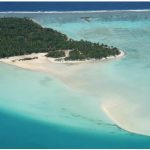French Polynesia: entry and exit requirements
Formalities, visas
Upon entry, a passport valid for 6 months from the intended departure date and a return flight or onward travel ticket must be presented. A visa will then be issued for up to four months upon entry.
Import and export of foreign currency
There is no limit for the import of foreign currency. However, only foreign currencies up to the imported amount may be exported again.
Import and export of goods
The import and export of weapons, ammunition or explosives is strictly prohibited. In addition, the import and export of plants and animals protected under the Washington Species Protection Act is prohibited. Violation can result in severe penalties.
Duty-free goods
200 cigarettes or 100 cigarillos or 50 cigars or 250 grams of tobacco may be imported duty-free. In addition, 2 liters of alcohol can be imported duty-free. The importation of drugs, weapons, ammunition and explosives is of course strictly prohibited. For example, sailors who have a weapon on board should have declared it beforehand.
Entry with pets
For the owners of dogs and other animals, when traveling abroad, the question arises whether they can even take their animals with them to the chosen travel destination, and if that is possible, then of course the question of the respective applicable conditions arises. Here with us you will find all the important information on this topic, seriously researched at the embassies or the Foreign Office.
The importation of pets into French Polynesia from Germany, Austria and Switzerland is prohibited. However, a transit stay is permitted if the animal remains at the airport.
For imports from other countries, you should contact the responsible French representative.
Pets in the airplane
When transporting pets in airplanes, there is the possibility that the animal flies together with an accompanying person (owner) or without such a person.
Transporting animals with an accompanying person (keeper)
In this case, proceed as follows: At the airport, the animal is locked in a transport box provided by the keeper beforehand. It must be ensured that the container is large enough that the animal can stand in it and turn around, and it must also be ensured that no liquids can run out (urine). This is done using suitable absorbent material, in the simplest case using a sufficient amount of newspaper.
There should also be a water bowl and, depending on the length of the flight, enough food. The transport container is handed over to the staff at the check-in counter. The transport fee depends on the weight of the animal. It is imperative to ensure that there is space for the animal for the flight booked, as the number of animals that can be transported is limited.
The animal is located in the machine in an air-conditioned area between the passenger deck and the cargo area. As a rule, no member of the crew takes care of the animal during the flight, not even to give water or food.
However, experience has shown that the stress of checking in and the take-off phase is so stressful for most animals that they sleep for most of the flight. The administration of sedatives before check-in is not only not recommended, as their effects cannot be foreseen under these conditions, but is even prohibited for reasons of security (smuggling). Many airlines also exclude a number of dogs (attack dogs) from transport.
Animal transport without an accompanying person
In this case, a specialist company must be commissioned with the transport, which then takes care of everything else. However, it should be ensured that the animal is picked up at the arrival airport by someone who is familiar to the dog. And of course all import regulations for pets for the country have to be explored beforehand and strictly adhered to.
Note
It has proven to be very helpful if you have accustomed the animal to such a transport container at home a few weeks before the intended flight.
French Polynesia: how to get there and transport
How do you get to French Polynesia?
Ship connections
Papeete has a port that is used by cargo ships, tankers and cruise ships. There are also ferry connections from Papeete to the island of Maorea, around 15 km away.
Recently, the islands have been increasingly approached by cruise ships such as B. from P + O.
Air connections
Tahiti has an international airport that is served by a number of countries and various airlines, such as: B. from Qantas, Lufthansa, Airfrance or Air New Zealand. Connections exist to Europe, the USA, Canada, Hawaii as well as Australia and New Zealand.
Travel in the country
In Tahiti you can get around individually either by car, motorcycle or bicycle and of course on foot.
Roads
There are currently around 2,600 km of roads, 1,740 km of which are paved. The infrastructure is currently being expanded with EU aid.
Rental cars
The main rental agencies are Aris Pacifar, Hertz and Europcar. Even a Rolls Royce with a chauffeur is available. However, the most convenient way to travel is to use a taxi, the drivers of which are very knowledgeable about the island.
Ferry connections/waterways Ferry
ports are located in Papeete, Mataura, Rikitea and Uturoa.
Air connections
The state has a total of 49 airports.
Bus
Various vehicles function as buses such as B. “pick ups” or open buses, the so-called “Le Truck”, with which you can explore the island. The bus stops are blue posts painted with a white bus.
International license plate
The international license plate of French Polynesia is:
| PF |
French Polynesia: embassies, consulates and tourist office
Representations of French Polynesia in Germany
French Polynesia does not have its own diplomatic mission; France is responsible for this.
The embassy of the French Republic in Berlin is located on Pariser Platz – in the immediate vicinity of the Brandenburg Gate. The embassy stands on the same ground that the previous representative office was on until it was destroyed in 1945. It should be mentioned that the property has been owned by the French state since 1860. After reunification, it was returned to France. The building was built in 1997 based on plans by the Parisian architect Christian de Portzamparc.
Embassy of the French Republic in Berlin
Pariser Platz 5
10117 Berlin
Tel: 0049 – (0) 30 – 590 03 90 00
Fax: 0049 – (0) 30 – 590 03 91 10
Email: kanzlei@botschaft-frankreich.de
Web: www. botschaft-frankreich.de
German representations in French Polynesia
Embassy
The Federal Republic of Germany does not have its own embassy in French Polynesia, but is only represented by an honorary consulate.
The embassy in Paris, France is responsible.
Embassy of the Federal Republic of Germany in Paris
13/15, avenue Franklin D. Roosevelt
75008 Paris
:
Ambassade de la République fédérale d’Allemagne
BP 30 221
75364 Paris CEDEX 08
France
Tel: 0033 – 1 – 5383 4500
Fax: 0033 – 1 – 4359 7418
Email: info@paris.diplo.de
www.paris.diplo.de
The German embassy in Paris is still responsible for:
- French Guiana
- Guadeloupe
- Martinique
- New Caledonia
- Reunion
- Wallis and Futuna
Honorary Consulate Germany in Papeete
10, rue du Commandant Destremeau
98713 Papeete, Tahiti
:
Consul honoraire de la République fédérale d’Allemagne
BP 4567
98713 Papeete, Tahiti
Tel: 00 689 – 42 92 26
Fax: 00 689 – 413828
Email: dieterflach @ mail. pf
Austrian representations in French Polynesia
Embassy
Austria does not have its own embassy in French Polynesia, but is only represented by an honorary consulate.
The embassy in Paris, France is responsible.
Austrian Embassy in Paris
6, Rue Fabert
75007 Paris
Tel: 0033 – (0) 1 – 4063 3063
Fax: 0033 – (0) 1 – 4555 6365
Email: paris-ob@bmeia.gv.at
www.amb-autriche.fr
www.aussenministerium.at/paris
Representations of French Polynesia in Austria
The
French Polynesia embassy does not have its own diplomatic mission abroad; France is responsible for this.
Embassy of the French Republic in Vienna
Technikerstraße 2
1040 Vienna
Tel: 0043 – (0) 1 – 502 750
Fax: 0043 – (0) 1 – 502 177
Email: presse@ambafrvienne.at
www.ambafrance-at.org
Swiss representations in French Polynesia
Embassy
Switzerland does not have its own embassy in French Polynesia. The embassy in Paris, France is responsible.
Embassy, Ambassade de Suisse in Paris
142, rue de Grenelle
75007 Paris
Tel: 0033 – (0) 1 – 4955 6700
Fax: 0033 – (0) 1 – 4955 6767
Email: par.vertretung@eda.admin.ch
Representations of French Polynesia in Switzerland
The
French Polynesia embassy does not have its own diplomatic mission abroad; France is responsible for this.
Embassy of the French Republic in Bern
Schosshaldenstrasse 46
3006 Bern
Tel: 0041 – (0) 31 – 359 2111
Fax: 0041 – (0) 31 – 359 2191
Email: presse@ambafrance-ch.org
www.ambafrance-ch.org
Tourist office
Tourist Office of Tahiti-Tourisme
Tel: 0049 – (0) 69 – 1753 7100
Fax: 0049 – (0) 69 – 753 7111
Email: info@tahiti-tourisme.de
www.tahiti-tourisme.de
Tourism Department of the Embassy of the French Republic
Lugeck 1-2/1/7
1010 Vienna
Tel: 0043 – 0900 – 25 0015 (€ 0.68/minute)
Fax: 0043 – (0) 1 – 503 2872
E-Mail: info.at @ franceguide.com
www.franceguide.com
French Polynesia: Travel Medicine, Vaccinations, and Warnings
Infectious diseases
In French Polynesia, the following diseases are to be expected in Germany and Northern Europe:
Malaria or yellow fever are not to be expected.
- Dengue fever, in 2002 there was an increase in infections with the dengue virus.
- Intestinal infections caused by contaminated food or water, including amoebas, lamblia, salmonella, shigella, worm infestation and all kinds of viruses and bacteria.
- tetanus
- diphtheria
- Hepatitis A and B
- Filariasis
Recommended vaccinations
when traveling to French Polynesia, the following vaccinations recommended:
- Diphtheria, a vaccination against diphtheria should always exist, also in the home country.
- Hepatitis A and B
- Typhus for special travel groups (backpackers) who are z. B. supply yourself with water in nature.
Malaria prophylaxis
When traveling in the country, it is strongly advised to undergo malaria prophylaxis. However, if the side effects seem questionable to you, you should at least have a “stand-by preparation” with you.
Compulsory vaccination
For all persons who enter from an area of yellow fever infected by the WHO, there is a compulsory vaccination against yellow fever.
Who pays for vaccinations in Germany?
Most people in Germany are vaccinated against a number of infectious diseases at an early age. However, the vaccination protection only lasts up to 10 years, in some cases even shorter. Therefore, before traveling abroad, you should carefully consider against which infectious diseases a vaccination is necessary or useful in the country concerned and whether the vaccination protection, if applicable, was not too long ago.
Most statutory health insurances have been reimbursing the costs for the following vaccinations since June 2007.
There is even no 10 € practice fee – but the insured usually have to pay the statutory additional payment, which is 10% of the vaccine price – that is at least 5 € and a maximum of 10 €. Under these conditions, the following vaccinations are free of charge:
- cholera
- diphtheria
- Early summer meningoencephalitis (TBE)
- Yellow fever
- Hepatitis A and B
- Meningococcal meningitis
- Pneumococci
- Polyo (polio)
- Tetanus (tetanus)
- rabies
- typhus
Some health insurance companies also reimburse the cost of malaria prophylaxis.
As a rule, private health insurance companies (inquire beforehand) also cover the costs mentioned.
Current warnings
Foreign Office of the Federal Republic of Germany
Citizens Service
Tel: 0049 – (0) 30 – 5000 – 2000
Fax: 0049 – (0) 30 – 5000 – 51000
Current warning notices:
www.auswaertiges-amt.de
French Polynesia: Currency, Exchange Rate and Shopping
The local currency is the Pacific Franc (CFP), Comptair Francais du Pacifique Franc, the official bank abbreviation is XFP. There is no subunit, so the smallest unit is 1 XPF.
The following banknotes are valid and in circulation in the country:
- 500 XPF
- 1,000 XPF
- 5,000 XPF
- 10,000 XPF
There are also the following coins: 1, 2, 5, 10, 20, 50 and 100 XPF
Exchange rate
You can find a currency converter here:
www3.forium.de
Bank opening hours
The banks have different opening times:
Either:
Monday – Friday: 8:00 a.m. – 3:30 p.m.
Or:
Monday – Friday: 8:00 a.m. – 11:00 a.m. and 2:00 p.m. – 5:00 p.m.
Credit cardsLa Carte Bleue, Visa and MasterCard are the most common credit cards.
Shop
Shop opening times Monday – Thursday: 7.30am /8.00am – 5.00pm Friday: 7.30am/8.00am – 4.00pmSaturday: morning
Cheap or country-specific goods, souvenirs
- Black pearls: Tahiti has a wide variety of black pearls.
- Pareu: This is a cloth that is curved around the hips.
- Vanilla from the island of Tahaa: The fresh spice is a fantastic souvenir.
- Monoi: Cosmetics made from coconut oil.
- Noni juice: see under medicinal plants
- Tattoo: An unusual souvenir is an original tattoo from the South Seas, from the region from which the art of body decoration originates. There are a large number of excellent tattoo artists in French Polynesia. B. prick according to traditional patterns of the Marquesa Islands.








